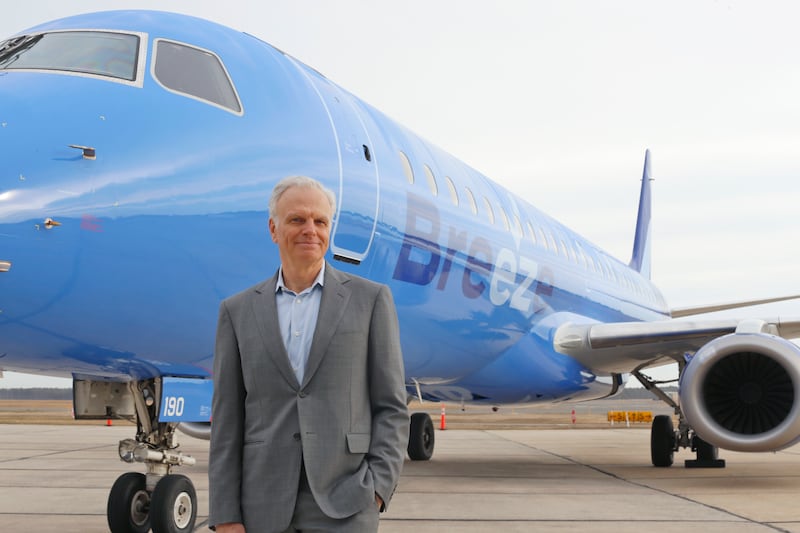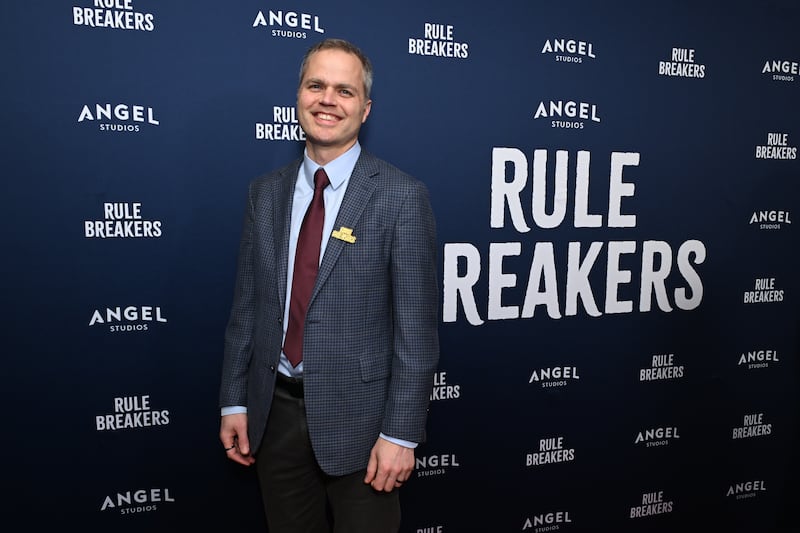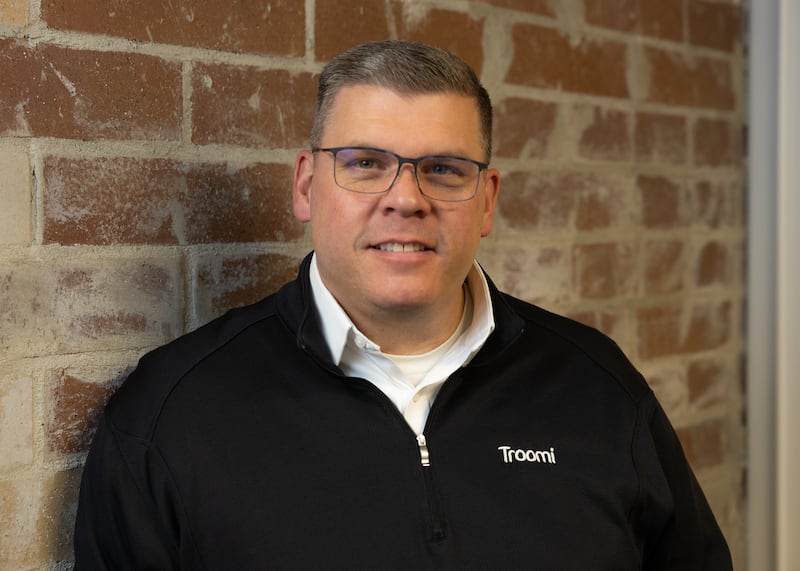This story appears in the April 2025 issue of Utah Business. Subscribe.
We’re so enchanted by stories of young entrepreneurs that they’re part of the American mythos. It’s almost common knowledge that Mark Zuckerberg founded Facebook at age 19, Bill Gates co-founded Microsoft at age 19, and Steve Jobs co-founded Apple at age 21. This obsession with youthful business owners is further seen in frequently published lists like Forbes 30 Under 30.
In Utah, the stereotype of young startup founders is alive and well — and there’s data to back it up. A 2023 study by LendingTree revealed that Salt Lake City is home to the youngest entrepreneurs in the United States, with an average age of 34.
While they might not get the same press as their greener counterparts, midlife entrepreneurs are quietly shaping the startup landscape. And according to three successful Utah founders on the right side of 40, they might even have some advantages.
Midlife entrepreneurs bring valuable experience to identify market gaps
Successful businesses fill unmet needs, and entrepreneurs with a few decades of career experience may have an easier time identifying gaps in the market.
Though he co-founded his first airline, Morris Air, when he was just 25 years old, David Neeleman is arguably best known for the airlines he founded later in life — including JetBlue (at age 38), Azul Brazilian Airlines (at age 48) and Breeze Airways (at age 58). With his airlines, he says, he tends to “zig when others zag.”

For instance, Neeleman used new planes with TVs and leather seats for JetBlue, a move copied by legacy airlines in subsequent years. With Breeze Airways, however, he nixed the TVs (and the accompanying maintenance costs) as customers now tend to seek in-flight entertainment on their phones and tablets instead. And with Azul and Breeze, Neeleman capitalized on regional routes that had plenty of demand but little competition from large airlines.
“We like to fly where people aren’t flying,” he says. “There are 125 cities in the United States that have lost more than 25 percent of their air service. As the big airlines retreated to their hubs and got bigger and bigger airplanes, they forced people in the small and medium-sized cities to go through a hub. We try to bypass the hubs and take people directly.”
Midlife entrepreneurs have cultivated rich professional networks over decades
Certain assets can only be built over time, and a reputation and a network are two of these. Without a decades-long resume and built-out network, young founders must rely on their own savings or attempt to chase venture capital, which is exceptionally difficult to secure. Only about five in 10,000 startup businesses — 0.05 percent — receive venture funding, according to a Fundera report. Reliable and well-connected access to capital via a professional network and reputation gives midlife entrepreneurs a strong upper hand. After all, a lack of funding is among the most common reasons startups fail.
Neeleman has been building his track record of growing successful businesses for decades, an investment that has paid repeated dividends — literally.
“The first airline I had was Morris Air, and we were already up and going and profitable when we raised a small amount of $25 million to grow a little bit faster in 1992,” he says. “We sold it to Southwest Airlines a year later, and the investors got a really good return. Then, I had a noncompete agreement, so I helped found WestJet in Canada. When my noncompete was up, I called back those investors and said, ‘Hey, do you want to do it again?’ They agreed, and we raised a lot more money that time — about $135 million that round — and went public for $1.7 billion. So I think a track record means a lot.”
Another Utah entrepreneur, VidAngel and Angel Studios co-founder Neal Harmon, found his first investors in his close circle. Even with the imperfect track record of a failed enterprise years before, he was able to source funding for Angel Studios from a network of associates.

“We were able to raise capital because we had relationships among the investor community from my failed business, from OraBrush [another previous business] and others we’d met,” Harmon says. “When it came time to raise money for Angel Studios, we went out on a Thursday and started meeting with all our contacts. We had our first check by the next Tuesday.”
Through Angel Studios, Harmon sought to offer families a positive storytelling experience that was engaging yet family-friendly — a product he didn’t see Hollywood selling. Despite competing with a well-established film industry, Angel Studios helped found and launch acclaimed series like “The Chosen” and broadcaster Dry Bar Comedy, as well as feature films that have won awards and made millions at the box office.
Bill Brady, the founder of Troomi — a wireless cellphone brand for kids and teens — has a similar funding story. Brady was the student body president at Brigham Young University, where he studied public relations and marketing. He later received an executive MBA from the University of Utah. He describes the network he formed during these years as “indispensable,” and from these connections, he sourced the capital for Troomi at age 45.

Midlife entrepreneurs have developed resilience through life’s setbacks
Rags-to-riches stories are quintessential American fairytales, and most entrepreneurs value the time they spend in the trenches.
In 2008, for example, Brady went a year without receiving a paycheck. “We never missed a payroll for our employees, but I went for a year without paying myself,” he says. “I don’t want to repeat that, but it was an incredible learning opportunity.”
Neeleman started Breeze Airways at possibly the worst time in history — the beginning of the COVID-19 pandemic. “We were confident and had hired 55 people, but then COVID hit and changed everything,” he says. “Between the supply chain and regulatory constraints, everything ground to a halt. Operating airlines received $57 billion in government aid to keep from laying off their people. But because we weren’t an operating airline, we got less than a million dollars.”
Harmon’s familiarity with risk and loss started very early in life. He grew up in Idaho on a potato farm, which his dad lost when Harmon was five years old. He recalls selling snacks and starting a cow business, raising and selling cattle at auction, to help the family make ends meet.
“Once you’ve seen the bottom of the barrel, you realize it’s just not that scary of a thing,” Harmon says. He attributes his risk tolerance and resilience to this era of his life — an experience that prepared him for the failure of his Memory Press business in 2008. It took seven years for him to pay off all his investors.
“There was one year where we lived off about $20,000 and food storage,” Harmon divulges.
Despite these huge challenges, each entrepreneur emerged successful. Breeze Airways just enjoyed its first profitable quarter in Q4 2024. Harmon repaid each of his investors, several of whom invested in his later businesses, and Brady received the 2023 National Parenting Product Award for his work on the Troomi phone.

“Is it really failure? You’re either winning or you’re learning,” Brady says. “Most entrepreneurs have been through something that didn’t work out exactly as they had hoped.”
Midlife entrepreneurs have learned what makes great teams tick
Brady believes that successful leaders recognize that success comes from the contributions of everyone on the team.
“As a younger entrepreneur, there’s so much urgency to get things done. That pressure is always still there, but with maturity comes perspective in the ability to say, ‘Not only do I not have to do this alone — I can’t do this alone,‘” Brady says. “I think younger entrepreneurs sometimes think, ‘This is about me.‘”
Neeleman concurs. Getting the right people with the right attitudes in place is a big differentiator between younger and older entrepreneurs, he says.
“It’s all about people. You want to take care of your people,” he continues. “We started with this notion that we wanted to be seriously nice, and that didn’t really cost us anything. If you teach your people to be seriously nice, guests are usually nice back to them. Amy Curtis-McIntyre — one of our founding board members and co-founders at JetBlue — coined the phrase, ‘We’re a customer service company that just happens to fly airplanes.‘”
As for Harmon, experience has taught him that listening to his intuition is instrumental in bringing the right people into the picture.
“For instance, you might want to hire somebody who is just not quite clicking because you don’t want to take time to do more interviews,” he says. “When you’re younger, you might say, ‘No, I’m moving fast. We’ve got to hire!’ But when you’re older, you’ve been through the pain of firing people, having people try to cause harm to the business from the inside or represent the business poorly with customers. … It makes it a lot easier to say, ‘No, I’m going to be patient, and we’re going to look for the right person.’ You understand the ramifications of a bad decision.”
“When I was older, we had five or six children by the time I started Angel Studios. The fact that it became a family thing and Trisha still wanted to do it meant that we were able to do it. You have so many people who are relying on you; it creates a motivation in and of itself to do well to provide. It raises the stakes.”
— Neal Harmon
Midlife entrepreneurs recognize the vital role of a support system
For entrepreneurs, some of the most important team members may not be on the payroll at all. Both Brady and Harmon note that their companies couldn’t have succeeded without their supportive spouses.
“I’ve been fortunate to have a wife who’s been up for the entrepreneurial journey and who’s been able to get comfortable with uncertainty from time to time,” Brady says. “She’s been a hero and a champion every step of the way.”
Harmon emphatically claims he’s an entrepreneur because he and his wife Trisha are entrepreneurs together.
“When I was young, I had a high tolerance for risk,” he continues. “When I was older, we had five or six children by the time I started Angel Studios. The fact that it became a family thing and Trisha still wanted to do it meant that we were able to do it. You have so many people who are relying on you; it creates a motivation in and of itself to do well to provide. It raises the stakes.”
Midlife entrepreneurs are persistent
The overall lesson? Entrepreneurs don’t stop — they iterate and innovate. And just because not all of them strike gold in their 20s and 30s doesn’t mean they don’t do so eventually. In fact, 56 percent of founders were over age 40 when their companies reached over $1 billion in valuation, according to a report by the Stanford Graduate School of Business.
Stanford finance professor Ilya Strebulaev found that 40 percent of U.S.-based, VC-backed unicorn founders founded at least one company prior to founding their unicorn company. So while there are plenty of young, famous entrepreneurs in Utah and elsewhere, they’re certainly not the only ones — or even the majority.
The advantage of midlife entrepreneurship, according to Brady, is that these founders have endured years of starting, failing and getting back up again.
“By the time you’re in your 40s, you’ve had enough experiences with enough people who have developed trust in you,” he continues. “Yes, they believe in the idea. Yes, they believe in the vision. Yes, they think it can be a successful company. But they’re investing in the entrepreneur. And you have to have been around the block a little bit to get that.”

